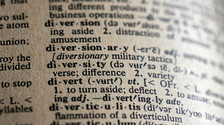azahrah.qolbaina
what the things that make verb 2 and verb 3 different
I was confised by verb 2 and verb 3. Can you explain it?
2012年3月16日 11:16
解答 · 3
What is verb 1?
2012年3月16日
It sounds like you're asking about patterns like "see - saw - seen", or (Brad's example) "go - went - gone".
Basically, the past participle ("verb 3") always needs a helping verb. Always. It can't function without one. So you can say "I have seen" or "it is gone", but "it gone" and "I seen" are completely wrong; you need "it went" and "I saw" (simple past) in these cases.
You use the past participle in perfect tenses (I have seen; I had eaten; I will have spoken), hypothetical forms using "have" (I should have known; it could have sunk), or passive forms (it is known; that was eaten).
Verb 2 (past simple) is the basic past tense of the verb.
2012年3月16日
Are you talking about the simple past (e.g., "went") vs. the past participle (e.g., "gone")?
2012年3月16日
還沒找到你要的答案嗎?
寫下你的問題,讓母語者來幫助你!
azahrah.qolbaina
語言能力
阿拉伯語, 英語, 印尼語, 土耳其語
學習語言
阿拉伯語, 英語, 土耳其語
你也許會喜歡的文章

Top 6 Mistakes to Avoid with Vocabulary Acquisition
24 讚 · 5 留言

Navigating Your First Job: Do's and Don'ts in the Workplace
44 讚 · 18 留言

What Content to Watch to Acquire Advanced-level Proficiency
75 讚 · 48 留言
更多文章
